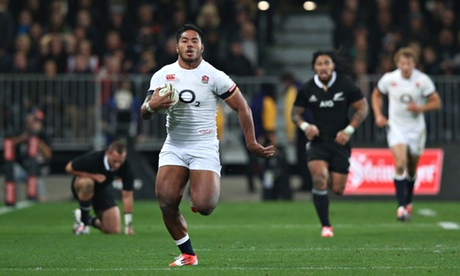
The reaction of Tom Wood a few minutes after the final whistle in Dunedin said a lot about where England now are as a team. He took no consolation in another close defeat to the World Cup holders, nor did he look for excuses. He lamented a victory that had got away because of mistakes made by his team and that spin-free candour, together with the clear pain of failure, augurs well for the next 16 months and beyond.
As Wood knew, England should have won. They could point to refereeing decisions in Auckland that did not go their way but this reverse, and with it the series, was down to them. They were commendably bold in what was a Test match to rank with the best, but at crucial moments they overplayed their hand and allowed New Zealand back into a match they should have been shut out of.
After taking a 10-0 lead, England needed to ensure the game was played on their terms, mixing things up but taking every opportunity to go through their forwards, kicking to touch rather than giving the New Zealand back three, where Ben Smith was every bit as brilliant as Israel Dagg had been awful the previous week, opportunities to counter-attack. Their failure meant the game was decided in the area where the All Blacks had a clear advantage, behind, whereas with Geoff Parling forcing the All Blacks to throw to the front of their lineouts, their attacking opportunities from the set-piece were minimised. That should have been the focus.
New Zealand have a mixture of finesse and power in their back division: Conrad Smith at 13 is their main passer, exploiting the strength of Ma’a Nonu and Julian Savea and the elusiveness of Ben Smith. The match turned when Billy Twelvetrees tried an unlikely off-load in the All Blacks’ half just after the interval, the ball was turned over and a few moments later Ben Smith was touching it down under the England posts.
It was the sort of pass Twelvetrees would have got away with on most occasions in the Six Nations, but mistakes against New Zealand invariably carry a price: they are masters of opportunity in a way England are not which is why I would like to see more driving mauls, an area of the game we excel at, in Hamilton on Saturday, and more lineouts. At the start of the second half it was important England re-established their forward superiority through their driving maul, something they had successfully done at Eden Park, and they were exposed to a higher error rate which only fed the All Blacks’ counterattack.
That is not to say ambition should be abandoned, merely tempered so that it becomes clinical. Stuart Lancaster has to look at his three-quarter options in training this week because Twelvetrees and Luther Burrell did not complement each other as much as Kyle Eastmond and Manu Tuilagi in the first Test while the selection of Tuilagi on the wing, which I hope was not a reaction to media pressure, was a failure.
Tuilagi is not a wing. He has neither the pace nor inclination to go looking for the ball. He is a centre and the closer he is to the action, the more he will be involved. As one of England’s most dangerous players the more often he has the ball, the better it is for the team. Burrell went well in the Six Nations, but England can now justifiably be described as contenders for the World Cup and that means using New Zealand and South Africa as yardsticks.
England need finishers on the wings. Marland Yarde impressed again and Chris Ashton scored a try after coming on. I would resist any temptation to move Mike Brown from full-back, but Tuilagi has to return to the midfield. What the second Test showed, again, was that New Zealand are not infallible, but you have to make pressure against them tell.
England scored one early try after taking charge of the lineout and driving mauls effectively, but they should have had more. They played at a high pace and looked to move the ball quickly, but sometimes less is more. There were three occasions when Conrad Smith looked to offload the ball in contact but held on because he considered passing too risky. Twelvetrees, in contrast, took too many chances by forcing things and England’s midfield lacked the finesse of their hosts’.
England have it in them to win the third Test and that would make the tour a success. game against the Crusaders will have no impact on selection and is about extending Lancaster’s options in a squad that has become so tight it will be very difficult for anyone to break into it so close to the World Cup, one reason why those campaigning for Steffon Armitage to be called up are missing the point about what England are now all about.
The game at the very top is all about tiny margins. There has been little to separate England from New Zealand in 160 minutes of rugby, but those differences are marked. The All Blacks were on top for little more than 20 minutes in Dunedin, but scored three tries. Their game is about the certainty of chance and there are no second chances against them.

